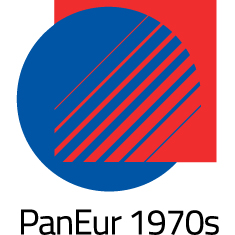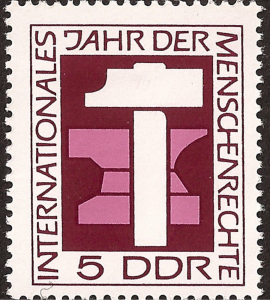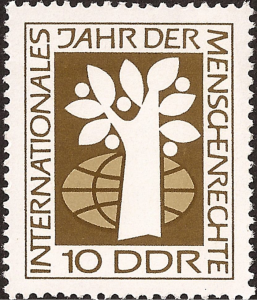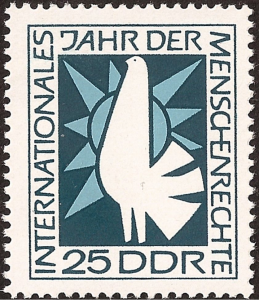Post-Doctoral Positions with PanEur1970s at the European University Institute
Posted on 3 May, 2016 inEastern Europe GDR Post Socialism Socialism

Two Research Associate positions are currently available with the PanEur1970s – Looking West: the European Socialist regimes facing pan-European cooperation and the European Community, based at the European University Institute. This five year project is investigating the European Socialist regimes’ expectations and predicaments vis-à-vis the opening of a space of pan-European cooperation in the long 1970s.
Research Associate Vacancy: GDR and European cooperation in the 1970s (24 months)
Applications are now open for a research associate to study these debates in the German Democratic Republic (East Germany) by exploring and analysing archival as well as published sources.
More specifically, s/he will do research on East Germany’s socialist elites’ views, policies, and ideas on the processes of European cooperation and integration in the 1970s.
The position will be for 24 months, starting from October 2016.
The appointed candidate will receive a monthly net salary of approximately 2500 EUR depending on qualifications and allowances (household allowance, expatriation allowance, travel allowance, medical insurance, and dependents’ allowances, if applicable).
Funding for research missions and participation to international conferences will also be provided.
The candidate will have a PhD in History (preferably international or economic history) or in a closely related discipline, as well as research experience on GDR’s archival records.
S/he will be fluent in German and have good command of English.
Knowledge of other European languages may constitute an advantage but is not required.
Research Associate Vacancy: Bulgaria and European cooperation in the 1970s (24 months)
Applications are now open for a Research Associate to study these debates in Bulgaria by exploring and analysing archival as well as published sources.
More specifically, s/he will do research on Bulgaria’s socialist elites’ views, policies, and ideas on the processes of European cooperation and integration in the 1970s.
The position will be for 24 months, starting from October 2016.
The appointed candidate will receive a monthly net salary of approximately 2500 EUR depending on qualifications and allowances (household allowance, expatriation allowance, travel allowance, medical insurance, and dependents’ allowances, if applicable).
Funding for research missions and participation to international conferences will also be provided.
The candidate will have a PhD in History (preferably international or economic history) or in a closely related discipline, as well as research experience on Bulgaria’s archival records.
S/he will be fluent in Bulgarian and have good command of English.
Knowledge of other European languages may constitute an advantage but is not required.
The deadline to submit applications for both posts is 31 May 2016.
More information and details of how to apply can be found on the PanEur1970s website:
Call for Papers: Human Rights after 1945 in the Socialist and Post-Socialist World
Posted on 12 October, 2015 in1989 after 1989 Communism Globalisation Human Rights Post Socialism Socialism

German Historical Institute, Warsaw
March 3 – 5, 2016
Call for Papers Deadline: 27 November 2015
Human Rights after 1945 in the Socialist and Post-Socialist World
Histories of late twentieth century global change have focused on its perceived winners on a macro-scale: democratic capitalism, global markets and individual rights. In such formulations, the “socialist world” and its history appear irrelevant to understanding global processes and unable to inform liberal Western democratic societies.
The global rise of human rights might look like a particularly striking case in point. The formal guarantees of rights in socialist societies, after all, seemed to have no substantial effect on these societies’ political and legal practices, and the debate on civil society in “the West” which east European human rights activists had inspired during the 1980s, did not survive socialism’s fall in that region.
In this conference, we want to question those narratives. Actors from the socialist world – be they state officials, loyal intellectuals or dissident activists – actively participated in international conflicts over the meaning of democracy, economic freedom, religious liberty and national self-determination in the post-war period. Socialist officials took part in drafting the U.N. covenants of 1966, in turning South African apartheid or repression in Chile into global causes célèbres or in promoting women’s rights. African socialists shaped human rights discourses by blending them with the struggle for self-determination, while Latin American activists grafted human rights to their Marxist ideas. Chinese Communists joined traditional ideas of cultural difference with Leninist ideology to create a distinct human rights discourse. Dissident intellectuals, on the other hand, did not necessarily take the West’s side in the Cold War when they criticized socialist realities, but developed innovative human rights vernaculars deeply shaped by their unique contexts. In sum, the “socialist world” did not just react passively to Western human rights politics, but was a vital participant in the story of the production of global human rights.
This conference seeks to explore how the socialist world can be written into the broader global narratives of the rise of human rights in the 20th century, and even revise these narratives. Our understanding of the “socialist world” is deliberately inclusive. It entails the socialist systems of eastern Europe, Eurasia, Africa, Southern and East Asia as well as socialist and Communist parties and movements more broadly, and anti-colonial or anti-dictatorial movements in the Global South.
We welcome papers from different disciplines and from diverse perspectives, whether dealing with official discourses, state policies, right experts, or national or transnational political movements.
We particularly encourage proposals on the following topics:
- rights cultures within socialist societies, including reflections on the global context of their construction;
- the contribution of socialist elites, experts and social groups to the global rise of human rights;
- connections across the socialist world in the production of conceptions of rights, including reflections on the role of international organizations or transnational movements;
- the importance of rights discourses for socialist regimes and movements in establishing legitimacy at home and abroad;
- the use of rights discourses by opposition movements, and the relationship between official/ alternative rights movements within socialist societies;
- the legacy of rights discourses within socialist and post-socialist societies today;
- comparisons, and connections between, the production of rights ideas in the socialist and non-socialist worlds;
- rethinking the role of rights and the collapse of socialist states;
- broader reflections on writing the socialist world into the history of rights;
- broader reflections on how these stories contribute to the rethinking of the story of cultural and political globalization.
This conference is the first in a series of meetings exploring how processes and practices that emerged from the socialist world shaped the re-globalized world of our times. Throughout, the legacies of this socialist engagement with globalising processes in the socialist and post-socialist world will also be an important point of interest.
Please send a brief abstract of 300-500 words, as well as a brief CV, by November 27, 2015, to Natalie Taylor at the University of Exeter (N.H.Taylor@exeter.ac.uk ). All organizational questions can be sent to Natalie Taylor. Academic queries should be sent to Hella Dietz (Hella.Dietz@sowi.uni-goettingen.de ).
Download the Call for Papers: Call for Papers Human Rights after 1945
Substantial funding opportunities for travel and accommodation are available, but we ask that potential contributors also explore funding opportunities at their home institutions.
This event is kindly supported by the German Historical Institute in Warsaw and the Leverhulme Trust-funded project 1989 after 1989: Rethinking the Fall of State Socialism in Global Perspective at the University of Exeter.
[Top]Writing Human Rights into the History of State Socialism
Posted on 24 March, 2014 in1989 after 1989 Human Rights

By Ned Richardson-Little

One of a number of East German postage stamps commemorating International Human Rights Year 1968. The hammer and anvil represent the right to work
The collapse of the Communist Bloc in 1989-1991 is viewed as one of the great triumphs of the human rights movement. But this ignores how socialist elites of the Eastern Bloc viewed themselves: not as the villains in the story of human rights, but as the champions.
In recent years, the rapidly expanding field of human rights history has done much to complicate triumphalist narratives of inevitable victory for Western liberal democracy over the forces of tyranny. Recent collections including those edited by Stefan-Ludwig Hoffmann, Jan Eckel and Samuel Moyn, have opened up new lines of inquiry exposing not only the contingency of these ideas, but also the conflicts amongst those claiming the mantle of universal human rights. On the Exeter University Imperial and Global History Centre blog in recent weeks, Fabian Klose has examined the important role of decolonization and post-colonial states in shaping the development of human rights politics, and Robert Brier has interrogated the idea of human rights as a product of neo-liberalism in the context of the Polish opposition. Here, I want to look beyond the human rights campaigns of dissident Eastern Europeans to that of the states they fought against.
While state socialism is normally seen as the definitional opponent of human rights – rejecting individual autonomy, independent justice, free elections, free speech and free practice of religion – the elites of the Eastern Bloc claimed that they were actually the true representatives of human rights. For them, the revolutionary victory over capitalism meant the end of class conflict and the abolition of the “exploitation of man by man.” The creation of a socialist society overcame the horrific abuses of the capitalist system, including war, imperialism and racism.

Another stamp commemorating International Human Rights Year 1968. The tree and globe represent the right to life
Eastern Bloc elites built upon Karl Marx’s denunciation of human rights rhetoric as a tool of the bourgeoisie to disguise their own class interests in the cloak of universal justice. They argued that while human rights were indeed a sham under capitalism, the socialist revolution had created a higher kind of human rights that allowed for real participation in all forms of political and economic life and achieved true equality across the class, race and gender lines. As the East German legal philosopher Karl Polak declared, “There can be no human rights without socialism!”[1]
When such rhetoric from the Eastern Bloc has been noted in histories of the Cold War, it is usually dismissed as a crude and cynical attempt to deflect Western criticism, particularly after the signing of the Helsinki Accords in 1975. That is, once the communist states were compelled to affirm the idea of human rights, they simply had to adjust their rhetoric in a desperate attempt to fend off protest from within and without.[2] These narratives are undermined, however, by the fact that state socialist elites were using the language of human rights well before Helsinki – the quote above from Karl Polak dates to 1946. In Hungary, the first scholarly work on human rights and socialism was written by legal scholar Imre Szabo in 1948.[3] As Jennifer Amos and Daniel Whelan have demonstrated, the Soviet Union was an active player in the human rights diplomacy of the 1950s. Such early efforts weren’t just rhetorical or academic: the German Democratic Republic formed the Committee for the Protection of Human Rights to campaign against abuses by the West and to mobilize citizens to campaign against the imprisonment of communists and peace activists in West Germany. Founded in 1959, this group predates the creation of Amnesty International by two years.
The 1970s are today seen as the turning point when international human rights exploded as a global movement, but at the beginning of the decade, it appeared to some observers that the West was simply outmatched by the Socialist Bloc. By 1968, the entirety of the Eastern Bloc had either signed or publically affirmed the UN’s International Covenant on Civil and Political Rights. While the United Kingdom, Italy, and West Germany did so early on, other Western countries lagged well behind with Canada signing in 1976, the USA in 1977 and France in 1980. In 1973, one observer from West Germany concluded,
With the change in majorities in the bodies of world organizations – particularly in the [UN] General Assembly – the socialist states have recognized the possibility of the politicization of human rights, and the free world has almost cleared off the field without a fight: the US by its human rights abstinence, the Western European countries by their regionalism.[4]
While the Helsinki Accords are now often portrayed as a coup for the West in “forcing” the East to accept terms that would eventually lead to its downfall, at the time, the idea of human rights was hardly seen as a devastating ideological weapon.
Including the perspective of state socialist leaders and elites is crucial to understanding human rights diplomacy in the post-war era. Such ideas and politics also were crucial to state socialist rule and influenced the development of dissident and opposition movements, as I have recently argued, along with Benjamin Nathans, Paul Betts, and Mark Smith and others. Celia Donert’s recent work similarly demonstrates how the explosion of women’s rights as human rights in 1990s can be in part traced back to the transnational feminism organized through Eastern Bloc organizations and events that have been dismissed as mere propaganda for communism. Rather than simply seeing the rise of human rights movements in the East as a direct importation from the West, this new scholarship shows how 1989 was also connected to the evolution of indigenous right cultures that were initially fostered by the state. This line of inquiry is not only valuable to the study of the Cold War and its end, but also to explaining the development of human rights politics in the post-socialist period.
In challenging liberal Western triumphalism, it is also vital to consider the perspectives of the socialist East. The appropriation of the idea of human rights by non-liberal and even dictatorial states is no relic of Cold War dynamics long since departed, but is continuing to this day in Iran and North Korea. In grappling with the developments of 1989, political scientist Peter Juliver argued that one had to begin a process of “rethinking rights without the enemy.” I would argue that in order to do so, we first must rethink the history of human rights including the “enemies,” and not just the victors.
[1] Karl Polak, “Gewaltteilung, Menschenrechte, Rechtsstaat: Begriffsformalismus und Demokratie,” Einheit 7 (December 1946): 138.
[2] For the main work asserting the discontinuous effect of Helsinki Accords for the Eastern Bloc, see Daniel Thomas, The Helsinki Effect: International Norms, Human Rights, and the Demise of Communism(Princeton UP, 2001) as well as Michael Ignatieff, Human Rights as Politics and Idolatry, University Center for Human Values series (Princeton UP, 2001), 19, which argues that the Eastern Bloc denied the validity of political and civil human rights prior to Helsinki.





